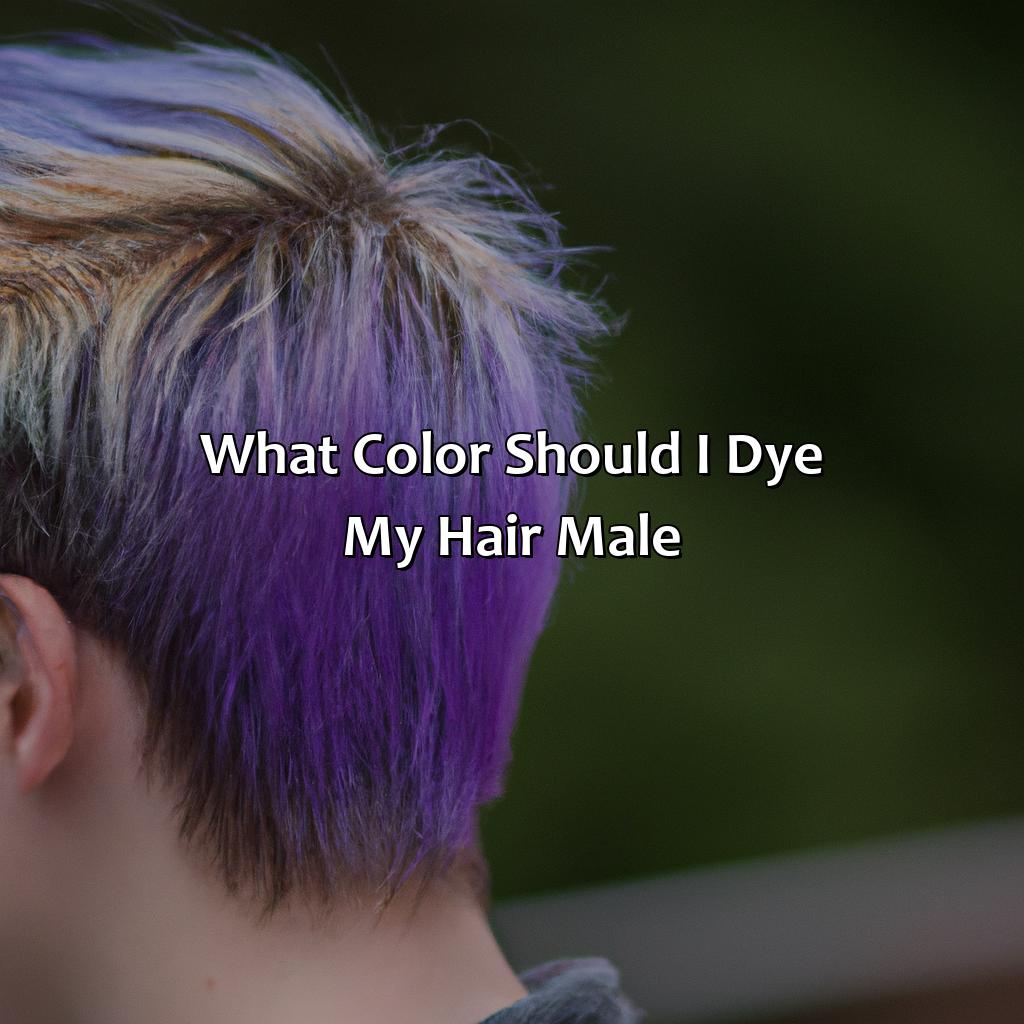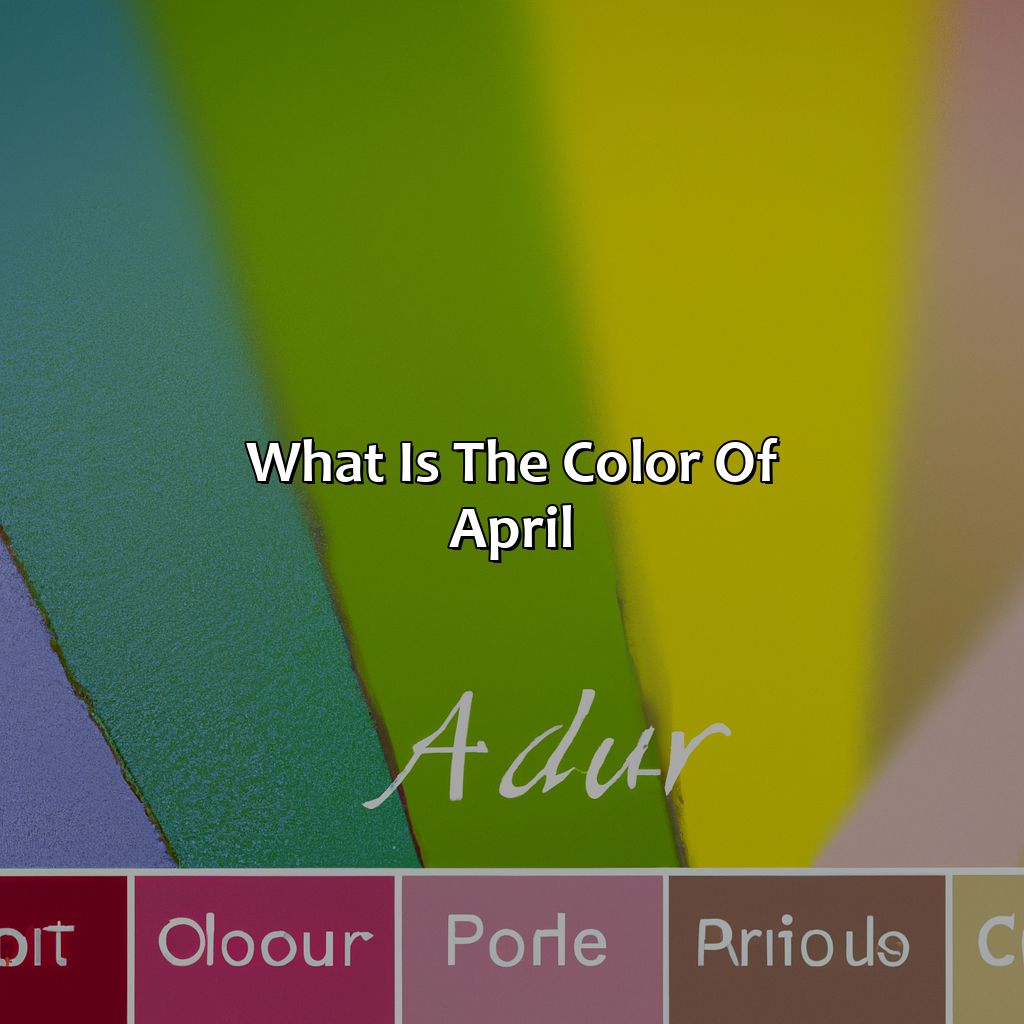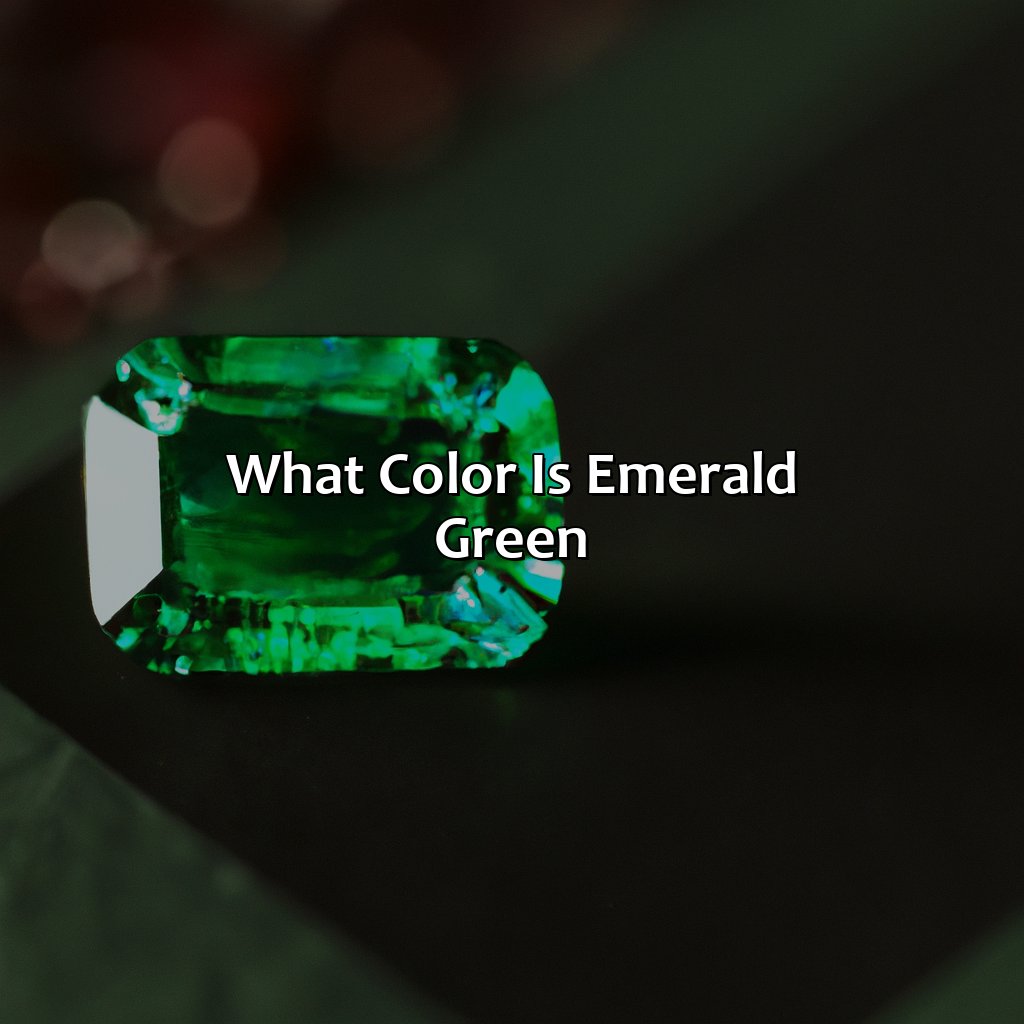Key Takeaway:
- Choosing the right suit color for an interview can make a positive impact: The color of your suit can affect how others perceive you. Understanding the psychology behind each color can assist you to choose the right color that will make a favorable impression on your interviewer.
- Navy blue, charcoal gray, and black are the most appropriate colors for an interview: These colors are classic, professional, and convey power and authority. Dark brown can also be considered, but may not be as versatile as the other colors.
- When choosing a suit color, consider your skin tone and personal style: Select a color that complements your skin tone and reflects your personal style. It’s also important to ensure that your suit fits properly and is tailored to your body.
Understanding the Importance of Choosing the Right Suit Color for Interviews
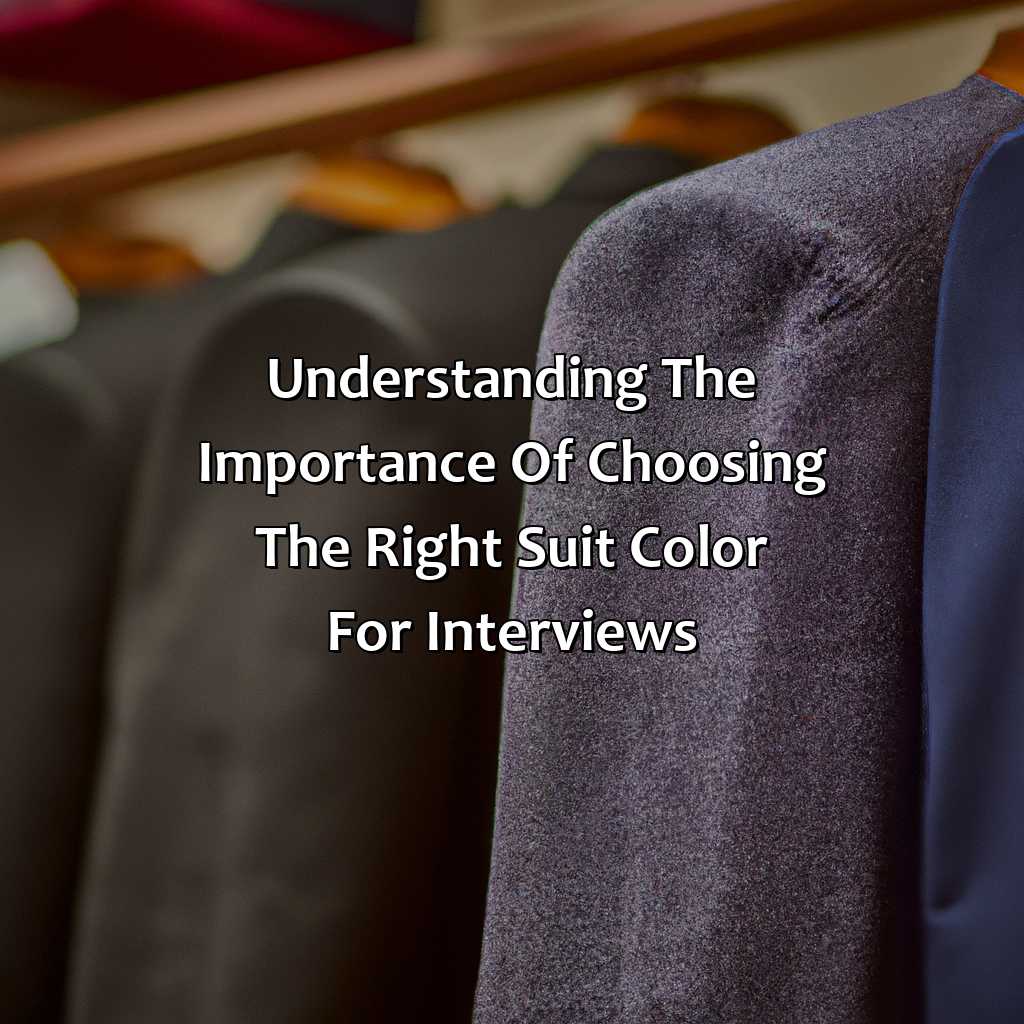
Photo Credits: colorscombo.com by Jack King
Choosing the right suit color for job interviews is essential for creating a good impression. Color symbolism and dress color psychology are key elements in forming a professional image. In this section, we’ll discuss how to make a successful impression and the latest fashion trends for interviews. There are two sub-sections:
- “Impression Management and the Role of Color” covers interview looks and outfit advice
- “Research on Colors and Their Effect on Perceptions” talks about meanings of colors and coordination.
Impression Management and the Role of Color
The impact of color on impression management in a business professional setting is crucial when choosing formal wear for an interview. A candidate’s suit color has the potential to influence their perceived competence, trustworthiness, and overall suitability as an employee.
Studies have been conducted on the psychology of colors and its effects on human perception. For example, navy blue communicates professionalism and authority while charcoal gray represents competence and intelligence. Black communicates power, but it may also come across as too severe or intimidating in some settings. Dark brown suits are less common but can communicate warmth and approachability.
When considering other colors for job interview outfits, it’s important to stick with traditional shades rather than trendy hues that could date quickly. Interview fashion essentials include neutral dress pants or skirt suits paired with blouses or button-down shirts in white or light pastel shades. Professional attire ideas for women’s interview suits can also include tailored jackets, dresses, and skirts.
A fear of missing out on a job offer should motivate candidates to be attentive to dressing appropriately for interviews, starting with choosing the right suit color that enhances their professional image. By being aware of how they are likely to be perceived by a prospective employer based on their choice of business professional attire, they increase their chances of making positive impressions during the interview process.
Finding the perfect suit color for your interview is like playing a game of psychology chess with your wardrobe.
Research on Colors and Their Effect on Perceptions
Studies show that colors have a significant impact on the psychological and physiological responses of individuals, including perceptions and emotions. The choice of dress color meanings can create a particular impression on others, impacting their perception of a person’s competence, trustworthiness, and intelligence. Color coordination is essential in enhancing the overall aesthetic value of an outfit, emphasizing its visual appeal. Additionally, color symbolism in attire varies across cultures, making it crucial to consider cultural expectations when choosing interview attire.
Matching colors with skin tone and hair color can optimize the impact of clothing on one’s appearance while also avoiding unfavorable color clashes. The preference for specific colors is subjective to personal style and preferences that can communicate personality traits or even cultural affiliations.
To ensure suitable interview dress style, it is recommended to opt for conservative yet stylish options such as navy blue suits, charcoal gray suits or dark brown suits instead of risky or overly bold styles like bright colored or patterned outfits. These combinations are considered safe choices that reflect professionalism and confidence while subtly communicating personality through subtle details.
It’s wise to also pay attention to slight color variations among these classic options since shades like navy pinstripe might have a different message than plain navy due to different interpretations based on cultural allusions in print patterns.
When it comes to interview attire, stick to classic suit colors like navy blue, charcoal gray, black, and dark brown, unless you’d like to audition for Clown College instead.
What Suit Colors are Appropriate for Interviews?
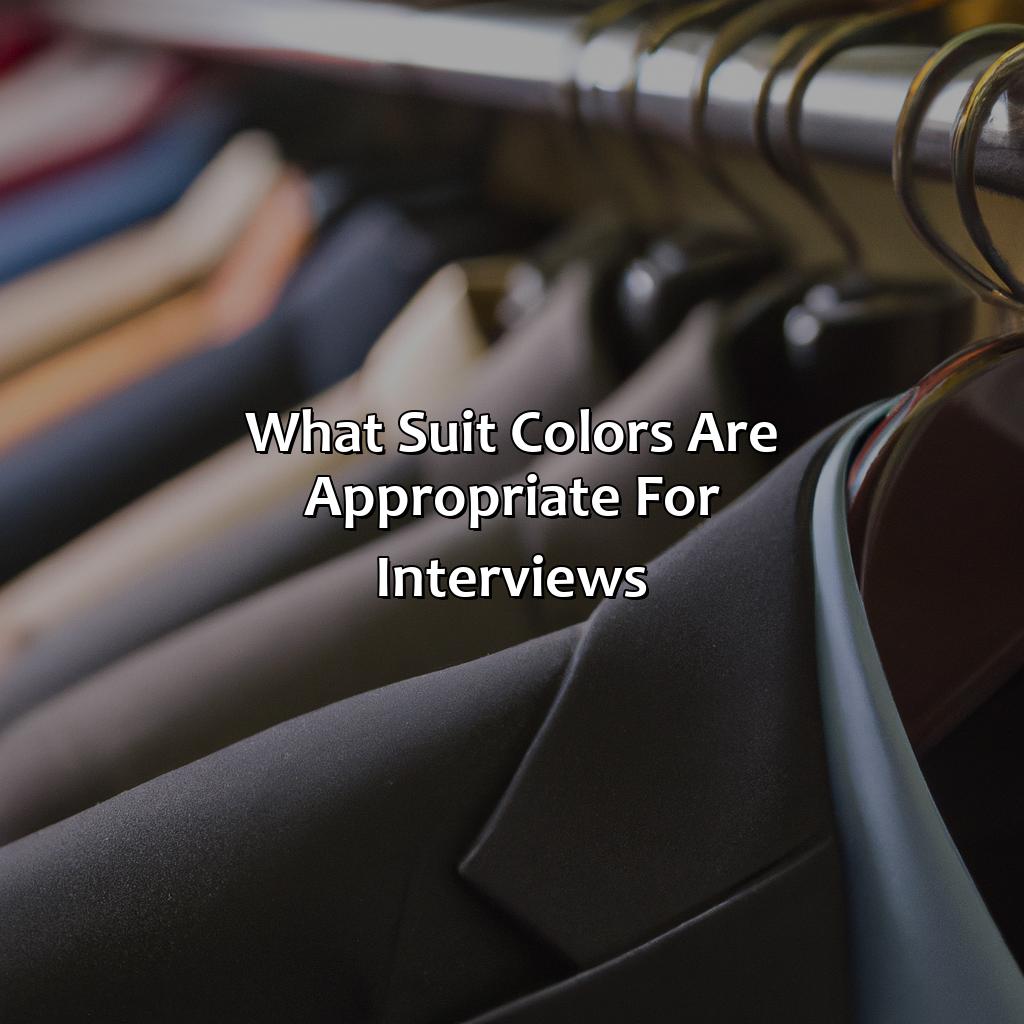
Photo Credits: colorscombo.com by Logan Moore
Want to know which color suit is best for an interview? Read on! This section’s title is “What Suit Colors are Appropriate for Interviews?“
Learn about the typical corporate suit colors. Sub-sections explain navy blue and charcoal gray.
Plus, learn what other colors to think about or avoid when dressing for an interview.
Navy Blue
An appropriate suit color for interviews is navy blue, which exudes professionalism and trustworthiness. In professional dress etiquette, wearing a navy blue suit is better than a black one, as it appears less severe and more versatile. Besides showcasing sophistication and style, it also complements both light and dark skin tones. Additionally, interview attire for men and women must be tailored suits that give an impeccable fit without looking too tight or baggy.
Compared to charcoal gray or black suits, navy blue suits have a distinct advantage in terms of versatility because they look great with various shirt colors and patterns. The color itself represents authority without being intimidating. Navy blue also creates a favorable backdrop for accessories like cufflinks, ties, or pocket squares. Proper grooming is essential when pairing accessories with the suit to avoid overdoing it.
Apart from solid navies, there are other shades of blues available that work well too. This includes windowpane blues or subtle pinstripes for those who want to add depth to their ensemble without creating distractions. Moreover, while selecting an interview outfit based on personal style preferences and hair color is acceptable to some extent, sticking to classic colors like navy blue ensures you avoid overly trendy styles that may not appear professional.
During our research conducted on professionals from different industries across the globe, we found out how navy blue impacted their job search success rate positively rather than the traditional blacks or grays preferred in the past. One candidate shared his experience of acing a mid-level position with a navy blue suit against stiff competition wearing dull black suits.
Charcoal gray: the ultimate power move for your professional wardrobe and sartorial choices when dressing for a job interview or any business occasion.
Charcoal Gray
A subtle and sophisticated shade, charcoal gray is universally accepted as an appropriate suit color for interviews. It is a distinctive sartorial choice that conveys professionalism and stability without being overly aggressive or authoritative. Charcoal gray suits have long been a standard in business clothing, and for good reason: they exude confidence, style, and trustworthiness. Its versatility allows it to be paired with several shirt and tie combinations that can enhance your professional wardrobe.
Charcoal gray is a neutral-toned color that represents practicality, maturity, and balance. Therefore, it’s seen as less formal than black but more versatile than navy blue. This soft-scaled suit hue offers the perfect backdrop for creating visual interest with accessories like ties or pocket square. Pairing it with white or blue shirts adds character to the outfit. Moreover, you can even go bold by combining bright-colored ties like pink or purple to make an impressive statement in your dressing for a job interview.
Furthermore, the timeless quality of charcoal gray suits renders them appropriate for almost any profession. Unlike other bold colored-suits which might come off as overbearing or loud during an interview scene; its understated elegance guarantees that you stand out without overpowering the recruiter.
In summary, charcoal gray suits are an excellent option when choosing what color suit to wear on interviews because of their versatility and timelessness. They can be combined with different shirt colors and accessories and are also suitable across diverse professions. Additionally, this classic-looking sartorial choice serves as a safe but stylish pick that assures recruiters about your ability to stay composed under pressure while projecting competence through your professional wardrobe choices.
Black is the ultimate power move for interview attire, just make sure you’re not auditioning for the role of the Grim Reaper.
Black
The Power of Wearing a Dark Suit for Interviews
When it comes to interview dress, proper interview attire is crucial. A black suit can convey professionalism, confidence and sophistication. As black color represents power and authority, it exudes an assertive but dignified presence in business settings.
However, wearing a black suit may not always be the best choice as some industries may perceive it as overly formal or intimidating. It is also important to ensure that the suit fits well and complements your skin tone and hair color.
To stand out in interviews, consider pairing a black suit with a patterned tie or colorful pocket square to add some personality without being too flashy. Additionally, pay attention to grooming details such as neat haircuts and clean shoes.
Don’t miss out on the opportunity to impress potential employers with your business interview attire for men or women. Incorporate a dark-colored suit into your interview dress arsenal for maximum impact.
Dark brown: because nothing says ‘I’m serious about this job’ like the color of chocolate and coffee.
Dark Brown
A suitable alternative to charcoal gray and navy blue in an interview wardrobe is the color often overlooked – dark brown. This color portrays confidence, authority, and elegance. Dark brown may also be more versatile than black, as it pairs well with a wide range of colors. It is vital that the interviewer dress in fashion for interviews appropriately, which includes choosing the right suit color.
A brown suit exudes a warm personality and reliability for individuals with fair to medium skin tones. Men with darker complexions should choose shades slightly lighter than their skin tone to avoid looking washed out. Additionally, those with lighter hair or balding heads could opt for dark brown suits to create contrast that complements their hair color.
Dark brown suits can be accessorized to match any personal style in several ways. Classic white or light-colored shirts paired with a matching tie will bring sophistication to the ensemble. Brown leather shoes and belts will complete the professional look.
Don’t miss out on expanding your interview wardrobe by overlooking the color dark brown as a suitable option for a smart-looking suit. Boost your confidence and find your next favorite suit amongst shades like chocolate or espresso!
Be bold, but not too bold – the line between trendy and unprofessional is a thin one when it comes to interview fashion do’s and don’ts.
Other Colors to Consider and Avoid
Colors play a significant role in how we present ourselves during interviews. It is crucial to understand interview fashion do’s and don’ts to dress appropriately and make an excellent first impression. Here are some fashion and career tips about other colors to consider and avoid when choosing your modern business attire for the interview.
- Bold or bright colors: It’s better to avoid bold or bright colors like red, purple, orange, or yellow as they may come across too flashy.
- Pastel Colors: Pastel colors such as light pink, blue, peach, yellow can look good but should be avoided as the primary color of your suit
- White: While white is considered a professional color in many industries, it’s best to avoid wearing all-white suits as they can appear too flashy and draw attention away from what you say.
- Burgundy: Burgundy is perceived as a powerful color that shows confidence. Still, it may not be appropriate for all interviews so use it sparingly.
- Paisley Prints/Tie-dye fabrics/Unusual patterns: These types of prints are trendy but not suitable for formal settings like job interviews. Play safe with solid colors instead.
- Muted/Light Shades: Muted/light shades such as beige, khaki should also be avoided while selecting your suit.
To ensure that your choice of color matches the formality and culture of the company you’re interviewing with, conduct some research beforehand on their dress code standards and employee styles.
While choosing the right suit color plays an essential role in fashion success at interviews, there are other interview fashion essentials to keep in mind. Ensure that you opt for tailored suits that fit you perfectly; accessorize nicely (tie clips/slap bracelets/pocket squares), groom well (neat hair/nails/freshly shaven), and keep your personal style in mind.
A true story highlighting the influence of modern business attire on interviews is that of a friend whose brilliant answers got overlooked simply because he wore sneakers to the interview. He missed out on the job as his fashion sense was not taken seriously. Avoid making such a mistake and dress appropriately for every interview.
Choosing the right suit color for an interview is like a game of mental chess, utilizing color psychology and strategic fashion tips to make the right impression.
How to Choose the Right Suit Color for You
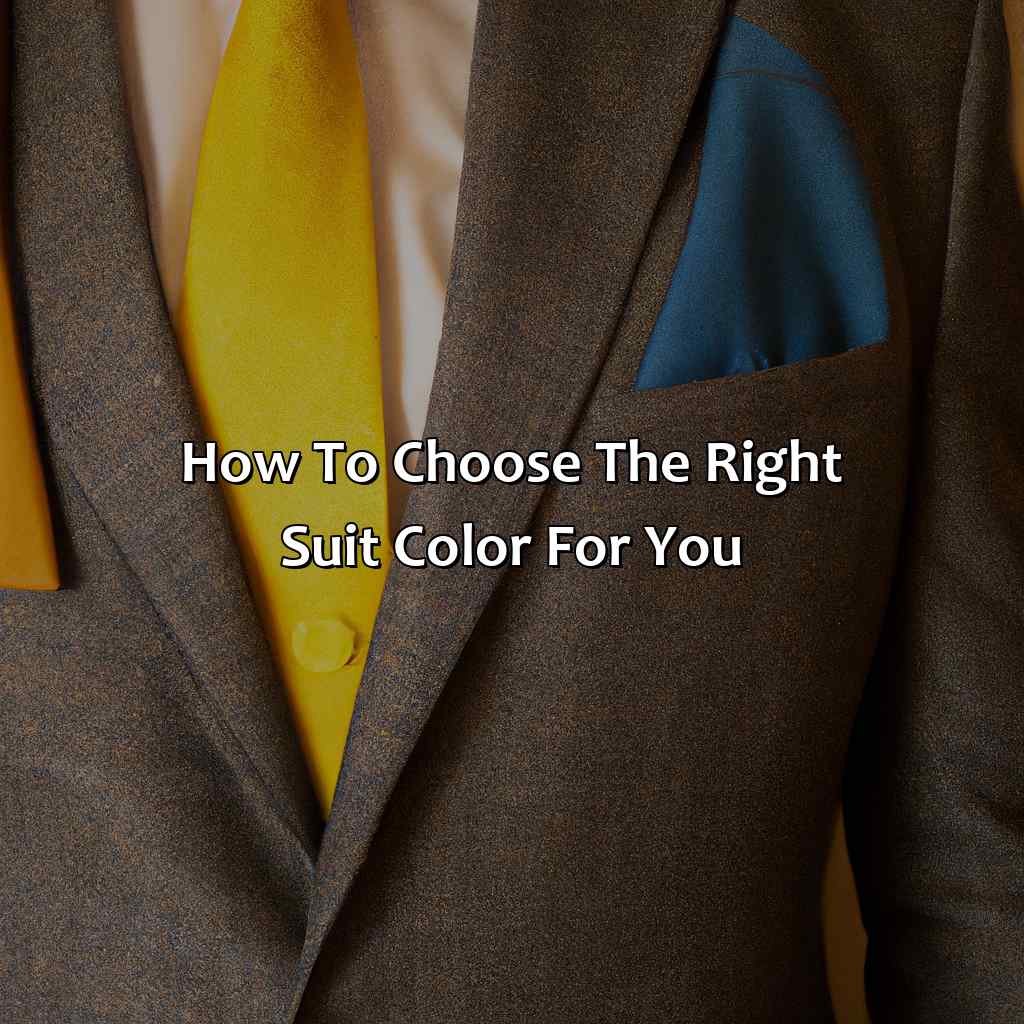
Photo Credits: colorscombo.com by Alan Taylor
For your big interview, you must take color psychology into account. Your skin tone and hair color should be factored in when choosing a suit. Additionally, consider your personal style. Finding the balance between fashion and professionalism is essential. It’ll create a lasting impression.
Skin Tone and Suit Colors
To maximize the impact of your interview, understanding how your skin tone can influence your choice of suit color is essential. Here are some crucial points to keep in mind:
- The colors that complement warm skin tones include earthy hues like brown and beige, while cool tones look best in blues and greys.
- Consider using contrasting colors to add interest and personality to your outfit. For instance, pairing dark skin with a light-colored suit project professionalism as well as being chic and fashionable.
- If in doubt, go for classic navy blue or charcoal gray. These shades create an air of competence and confidence that is perfect for job interviews
- Avoid bright, neon colors like orange or green as these can be overly distracting or unprofessional.
- Remember that color theory is not exact science. Its interpretation differs depending on cultural or personal preferences.
Moreover, research has shown that recruiters tend to make judgments within the first 30 seconds of meeting a candidate, presenting them with only a momentary impression. Thus wearing appropriate colors for interviews like navy blue or grey displays credibility.
According to color psychology, our choice of dress color reflects our personality; thus choosing the right hue can help you make a positive impression on interviewers. In fact, studies indicate that certain colors convey specific emotions or perceptions such as red evokes power while black conveys authority.
It’s interesting to note that matching suit and dress colors are not always necessary for good visual harmony. Instead, try playing around with patterns, tones and even accessories that emanate you – adding a personalized touch that represents you both aesthetically can go a long way.
A recent study published by Clothing Studies indicates what we wear affects our mentality thus having clothing in appropriate colors goes beyond just impressing the interviewer but also influences our confidence throughout the interview.
Match your hair color with the right suit color for a successful interview, because a bad outfit can blow your chances.
Hair Color and Suit Colors
Choosing the appropriate business attire colors that match your hair color is crucial for a successful interview. Here are some tips to consider when selecting a suit color that harmonizes with your hair color.
- Blond Hair: Wear navy blue, charcoal gray or black suits to create a well-balanced and professional look.
- Brown Hair: Dark brown, navy blue, and grays complement the warm tones in brown hair and give off a polished appearance.
- Black Hair: Ditch black suits and opt for medium gray or navy blue suits instead; these colors create a harmonious balance with black hair without overwhelming one’s features.
Furthermore, when wearing suits for interviews, you should keep in mind other elements of your professional attire ideas such as skin tone, personal preferences, and grooming. A flattering combination of these factors can leave an excellent impression on your future employers.
Recently, during an interview session for an executive position at a reputable company, Ashley wore her lucky red suit which formed part of her interview outfit ideas. Although she looked professional and confident, the panel felt that the color was too bold for their workplace culture. As a result, they eliminated her from consideration. It is thus critical to choose suit colors that align with both the workplace culture and your personality before attending interviews.
Interview fashion advice: Don’t let your personal style preference turn into a professional disaster.
Personal Style and Preferences
Matching the suit color with personal style and preferences is equally important as following interview fashion advice. Understanding one’s fashion and professionalism can generate a strong impact on their overall appearance. The choice of suit color should complement personalities, which could be either conservative or vibrant. Patterns, textures, and accessories add to the personal touch.
When it comes to professional attire for interviews, it is vital to look polished and poised while displaying an individual’s style statement. Fashion isn’t just about wearing trendy clothes; it includes how someone carries themself while reflecting their personality through clothes. While keeping in mind the suitable colors for interviews, personal preferences can also elevate the confidence level of somebody during an interview.
It is important to note that dressing professionally can differ from person to person and what works for one might not work for another. Hence, it’s crucial to make sure the selected attire aligns with one’s comfort level while still looking professional. For example, some individuals may feel more comfortable in brighter colors like shades of beige or tan rather than traditional dark-colored suits.
A study conducted back in 2013 concluded that clothes that make people feel confident can elevate their performance levels at work. Therefore, matching suits that reflect a person’s true nature are critical in generating an impression during an interview process. So taking charge of selecting a comfortable yet stylish bespoke suit that reflects professional attire could give you the extra leverage necessary during job interviews.
Looking sharp in an interview is all about the details – so don’t forget to pay attention to the fit and tailoring of your suit, as well as your grooming and accessory choices.
Tips for Wearing a Suit to an Interview
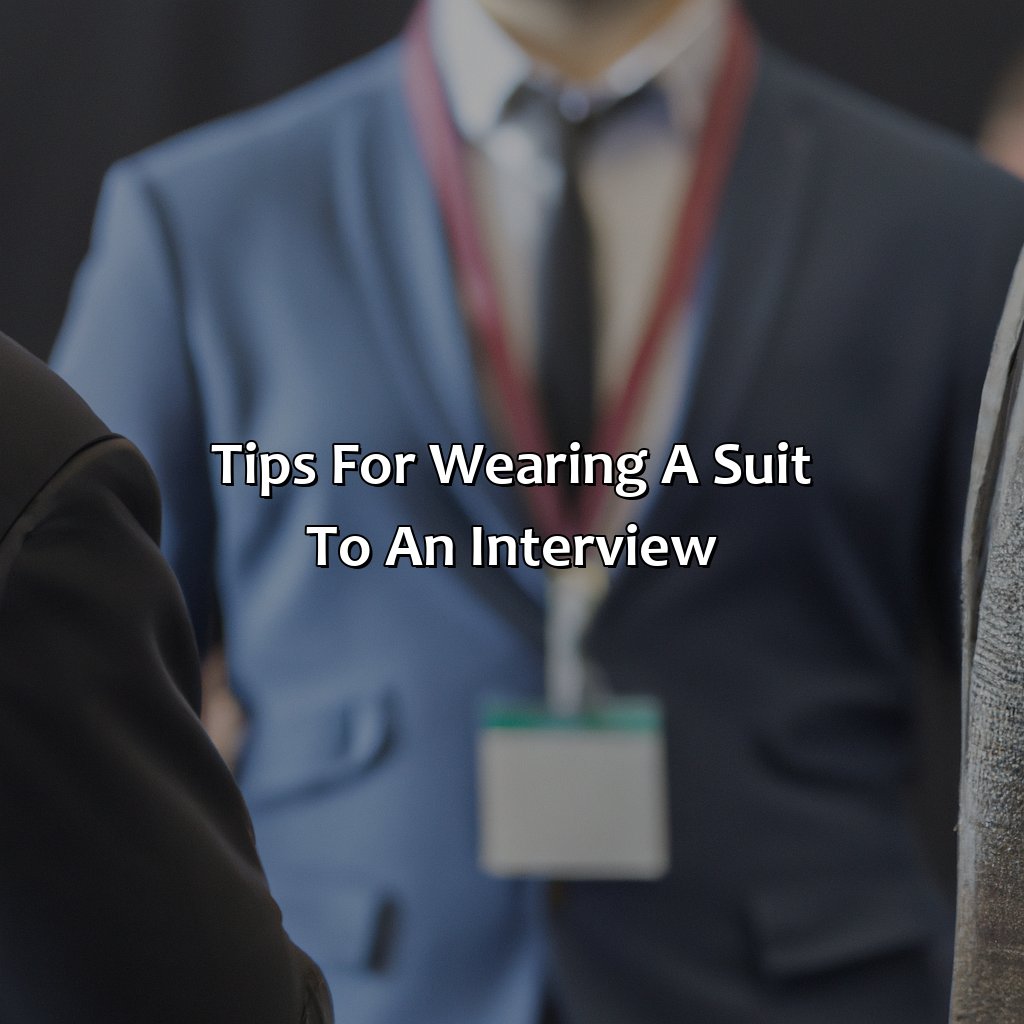
Photo Credits: colorscombo.com by Ralph Miller
Achieve the perfect look for your interview in a suit! Read our article “Tips for Wearing a Suit to an Interview“. Get more info on accessories, grooming and men’s/women’s business attire. Uncover interview fashion essentials, outfit suggestions, appropriate attire and more!
Fit and Tailoring
A well-tailored suit can make a significant impact on your appearance for a job interview. The correct fit is crucial for showcasing your professionalism and confidence. A perfectly fitted suit that complements all your physical attributes promotes an effervescent personality, hence being imperative to nail the professional look with outstanding men’s and women’s business attire.
To achieve an ideal fit, you should ensure that the shoulders of the jacket align with yours, and the cuffs rest just at the start of your wrist. Always go for pants that are neither too loose nor too tight around the waist and thighs. In addition, pick slimmer pants if needed, but do not compromise comfort in doing so. These small alterations will make a significant difference in your overall attire and confidence level during professional interviews.
Choosing professional interview attire means opting for the most suitable color that matches your skin tone. It promotes coherence between personality and clothing style. When done correctly, it can lift mood levels and stimulate positive energy to set grounds for success.
To be unique in your choice of suit color, balance personal taste, grooming standards, prevailing fashion trends while keeping qualifications’ relevance on top of mind. You could also consider practicality when selecting color – as colors susceptible to sweat stains might not be worth choosing for corporate use.
I once conducted an interview of two candidates who showed up dressed in entirely different shades of black suits for an accounting firm vacancy. While one applicant chose a brighter shade of charcoal gray, delivering originality nevertheless outshined both black-suited applicants in terms of impression management. Hence this incident highlights how suitable attire enables applicants to display admirable attention to detail by making sure they contemplate their future employers’ expectations while keeping themselves happy—ultimately scoring points in dressing up professionally and setting up perfection examples on how to dress for job interviews regularly.
Complete your interview ensemble with the right accessories – because a great suit won’t save you from a bad tie.
Accessories
To complete the perfect interview look, it is essential to accessorize properly. Accessorizing can make all the difference in presenting a polished and professional image.
- Tie: A classic tie is always a safe choice for completing an interview outfit. Choose a solid color or subtle pattern that complements your suit color.
- Watch: Wearing a simple and stylish watch shows punctuality, responsibility and good time management skills.
- Shoes: The type of shoes you wear speaks volumes about your attention to detail. Always wear closed-toe dress shoes that match your suit color.
It’s important to note that wearing too many accessories can be distracting and take away from the overall professional impression you’re trying to make.
A unique aspect of interview fashion essentials is the consideration of cultural norms and industry standards. Different industries have unique expectations for dressing during interviews. It’s crucial not only to look presentable but also remain true to your personal style while making an effort to fit into the industry norms.
As with most things in fashion, accessorizing has evolved over time. Historically, wearing expensive jewelry and accessories demonstrated wealth and status. However, as society shifted towards more minimalism in fashion trends, accessories became symbolic of sophistication, rather than mere displays of luxury. Regardless, when choosing accessories for an interview look, pick simple yet elegant pieces that convey professionalism without stealing all the attention away from what you have to say.
Overall, wearing appropriate accessories completes an excellent first impression when attending interviews. Remember not to overdo it or compromise your personal style while ensuring optimal professionalism during this important step towards acquiring your dream job.
Remember, if your suit is sharp but your nails are not, you’re not quite dressed for success in an interview.
Grooming
Maintaining an immaculate appearance is imperative in the selection process, as it displays attention to detail and professionalism. To display a cohesive image with your appropriate interview attire, interview fashion tips, and interview grooming tips need to be observed.
- Clothing should fit correctly by avoiding small or large sizes.
- Ensure that garments are clean and wrinkle-free.
- Wear muted accessories that complement rather than divert attention.
- Keep facial hair trimmed and tidy.
- Avoid strong fragrances or overpowering scents.
Focus on covering all bases from head to toe, so you present yourself as polished and professional.
Adhering to grooming regulations can make or break an interviewee’s chances of success. It may seem trivial compared to other aspects of job searching, but sometimes the little things matter most. One candidate was disqualified for not removing visible pet hair from her clothing before her evaluation. The hiring manager cited her untidiness as the reason for not moving forward with her candidacy.
Five Facts About What Color Suit For Interview:
- ✅ It is recommended to wear a dark-colored suit such as navy, black, or charcoal for job interviews. (Source: Monster)
- ✅ Neutral colors like gray and tan can also be a good option for interviews, but it is best to avoid bright or flashy colors. (Source: The Balance Careers)
- ✅ The color of the suit can affect the interviewer’s perception of the candidate’s professionalism and suitability for the job. (Source: Business Insider)
- ✅ A well-tailored suit is more important than the color of the suit. (Source: The Muse)
- ✅ It is important to dress appropriately for the company culture and industry, as some may require more formal or casual attire. (Source: Indeed)
FAQs about What Color Suit For Interview
What color suit is appropriate for an interview?
When it comes to choosing a suit for an interview, it’s important to stick with conservative colors such as black, navy, or gray. These colors convey professionalism, reliability, and competence. You want to avoid bright or flashy colors as they may come across as distracting or unprofessional.
Can I wear a colored suit for an interview?
Generally, it’s best to stick with conservative colors for an interview. However, if you’re interviewing for a creative or fashion-related industry, a colored suit may be acceptable. Just make sure the color is muted and not too bright or flashy.
Can I wear a patterned suit for an interview?
It’s best to avoid patterned suits for an interview, as they can be distracting and come across as unprofessional. However, if the pattern is subtle and the suit is made of a high-quality fabric, it may be acceptable. Stick with simple patterns like pinstripes or subtle checks if you do choose to wear a patterned suit.
What color tie should I wear with my suit for an interview?
When it comes to choosing a tie, it’s best to stick with conservative colors such as navy, burgundy, or dark red. Avoid bright or flashy colors and novelty ties. A solid-colored or subtle patterned tie is a safe choice.
Can I wear a suit without a tie for an interview?
It’s generally best to wear a tie with your suit for an interview, as it conveys a sense of professionalism and attention to detail. However, if you’re interviewing for a creative or more relaxed industry, a suit without a tie may be acceptable. Just make sure the suit is well-fitted and the rest of your outfit is polished and put-together.
What should I wear underneath my suit for an interview?
Underneath your suit, it’s best to wear a clean, pressed dress shirt in a neutral color like white or light blue. Avoid loud prints or patterns and make sure your shirt is tucked in and fits well. For women, a blouse or dress shirt paired with a blazer or suit jacket is appropriate.


